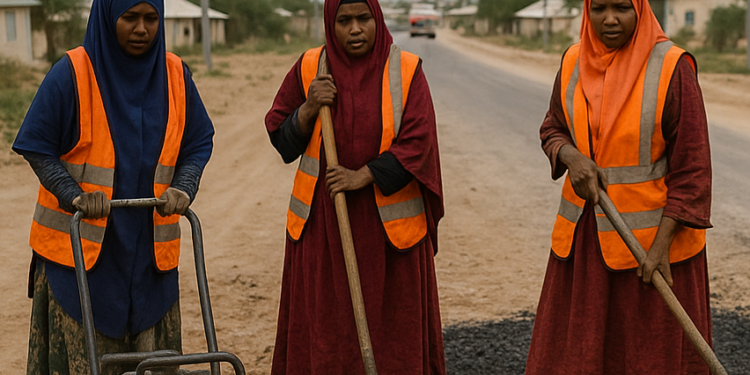
In Mogadishu,where the construction industry has historically been a male-dominated field,things are beginning to change. Amid the scorching heat,the roar of heavy machinery,and the relentless pace of the work,two women — Farhiya Abdikadir Mohamed and Halima Abukar — walk confidently among their colleagues. Their safety vests reflect not only the sunlight but also the glow of a long-awaited social transformation.
Their stories are part of a broader change that has already benefited 494,910 people — 49% of a one-million-person target — across six Somali cities,including Mogadishu,Garowe,Baidoa,Kismayo,Dhusamareeb,and Beledweyne. More than half of the beneficiaries are women,and 14% are internally displaced persons. The infrastructure work includes building 34 kilometers of roads with solar lighting,sidewalks,drainage,and landscaping,along with a 145-meter bridge and 6 kilometers of rehabilitated drainage. Ongoing projects — 53 additional kilometers of roads and 2 kilometers of drainage — are expected to reach another 700,000 beneficiaries in the coming months.
El nuevo índice del BAfD revela el potencial de reforma en la prestación de servicios básicos en África
At the heart of this process are women like Farhiya and Halima,who challenge traditional roles and earn their place in a demanding profession. For Farhiya,the path was not easy. “I grew up in a society where women were expected to be teachers,caregivers,or small business owners. But I always wondered why only men worked on the roads.” Her opportunity came through an open recruitment campaign. Although she initially doubted whether she could handle the physical work and be accepted by her male colleagues,she decided to give it a try. “If they could do it,so could I,” she told herself. Halima,a mother of seven,joined the team out of necessity. She had worked as a tea seller,cleaner,and seamstress,but none of these jobs provided financial stability. “I wasn’t sure if I could keep up with the work,but I had no choice. My children needed food,school,and shelter.”
In their early days,the physical labor was not their only challenge. “When I picked up a shovel for the first time,some men laughed at me. They said I wouldn’t last a week,” Halima recalls. However,through persistent effort and unwavering determination,both women earned respect. Today,their coworkers consider them essential members of the team. The technical training they received in workplace safety,machinery operation,and asphalt laying strengthened their confidence and skills. “They no longer see us as women trying to do men’s work,” says Farhiya. “They see us as colleagues.”
Mohamed Sheikh Ahmed,a community engagement specialist with the Banaadir regional administration’s project implementation unit,has witnessed their transformation firsthand. “Halima and Farhiya are among our hardest workers. It’s not just about employment; they’re helping change mindsets about what it means to be a woman in Somalia.”
The benefits go beyond the professional. For Farhiya,the job means independence. “I no longer depend on anyone to support me. This work has given me dignity.” Halima can now provide for her family’s basic needs: food,rent,education. “This job gave me life and hope.” Both have bigger ambitions. Halima wants to train and encourage other women to move forward. Farhiya dreams of leading construction projects and becoming a role model for young women. “I want to prove that women can reach the highest levels in any field.”
The change is already felt in their communities. “People used to say construction wasn’t for women,” says Halima. “Now they ask me how they can join.” Drawing from their experience,they encourage new generations to break barriers. “There is no such thing as men’s work or women’s work,” she says. “You only need skill and determination.” As they walk the new roads they helped build,Farhiya and Halima know they have done much more than lay asphalt. They have paved a way for thousands of Somali women to build their own futures—without limits or permission.
United News - unews.co.za